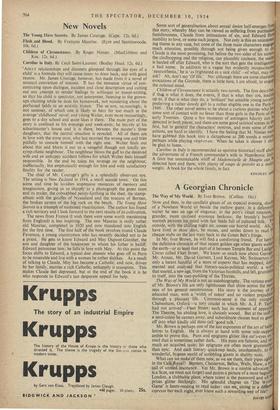A Georgian Chronicle
The Way of My World. By Ivor Brown. (Collins. 16s.)
Now and then, in the candlelit gleam of an especial evening, shad. of a 'Nowhere World sit beside the mellow guest; in a deferen10 waiter he sees an age of elegance; in the port's ritual rotation, grander, more civilised existence beckons; the brandy's burnil! warmth pictures his Jnind with fair fields full of cultured folk. V outside, with the chilling night air, comes our horrid world. All, gg, have lived in those days, he muses, and settles down to read Ii cheque stubs on the last train back to the Green Belt's fringe. In Mr. Ivor Brown, he will find a comforting friend. For here the definitive chronicle of that recent golden age-when giants walk°, the earth—or at least that part of it between Temple Bar and Ludagi" Circus called Fleet Street. We know so much now about Georg',,` Mr. Annan, Mr. David Garnett, Lord Keynes, Mr. Swinnerton only a lucent handful of a team of experts that has mapped, do'w„ mented and analysed that literary-socio-political world; a worw, that soared, a new age, from the Victorian foothills, and fell, grumblio to itself, into the suet-pudding of the Thirties. The Way of My World is not an autobiography. The various even, of Mr. Brown's life are only lighthouses that shine across the nisv, seas of his general reminiscence. His story is the journey of tw educated man, with a 'width of talent' and no violent prejud. through a pleasant life. Common-sense is the only corn Cheltenham, Oxford—'a tory citadel in which Mr. A. J. P. TO had not arrived'—Fleet Street: each has its moment of appraisv The Theatre, his abiding love, is choicely wooed. But at the sniff a semi-colon he canters away, and subordinate clauses lead us gent' off into what kindly old dons call 'good talk.'
Mr. Brown is perhaps one of the last exponents of the art of belt, lettres in English. He is always at hand with some side-sterol/1 amble to prove this. Puns and epigrams glitter like cat's-eyes oil, road that is sometimes rather dark. His puns are famous, and v.t much an acquired taste; his epigrams are often more grammagt,'S than epic. And each literary quickstep leads, unashamedly, to ilw wonderful, bygone world of scribbling giants in shabby suits.
What can we make of them now, as we see them, their pipes ag10; in the Cafe Royal? Bennett, Chesterton, Belloc, Wells, Shaw, a (0 call of unread resonance. Yet Mr. Brown is a nimble advocate (1101 is a Scot, we must not forget) and paints a picture of a most beguic London, a clubbable place, where talent is the password and all u'r„ prizes glitter fetchingly. His splendid chapter on 'The Will Game' is heart-rending to read today : can we,, sitting in a diffeg espresso bar each night, ever know such a rewarding way of life?








































 Previous page
Previous page